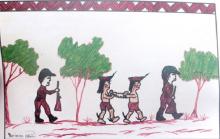Land Library
Welcome to the Land Portal Library. Explore our vast collection of open-access resources (over 74,000) including reports, journal articles, research papers, peer-reviewed publications, legal documents, videos and much more.
/ library resources
Showing items 1 through 9 of 31.GRAIN has documented at least 135 farmland deals for food crop production that have backfired between 2007 and 2017. They represent 17.5 million hectares. These are not failed land grabs, since the land almost never goes back to the communities, but failed agribusiness projects.
Includes the indigenous peoples of Ethiopia; Ethiopia’s dire context; food insecurity; land grabs, conflicts and food security; development by displacement I: Ethiopia’s land investment policies; table of land deals with foreign companies in Gambela since 2007; development by displacement II: Eth
El territorio weenhayek aún continúa en proceso de saneamiento. De los 197.000 hectáreas demandadas por los indígenas solo se tituló el 30%.
Highlights the role of European Development Finance Institutions (DFIs) in possible land grabs and questionable forestry projects in Africa. Documents 9 cases involving 8 of the European DFIs in Cameroon, DR Congo, Sao Tome, Sierra Leone, Tanzania and Uganda.
Contains framing human rights in the global land rush; the impact of land grabbing on human rights; EU actors’ involvement in land grabbing; understanding investment webs; 5 mechanisms linking the EU to land grabs; the extraterritorial obligations of the EU and its member states; the EU’s respons
Looks at how the ESRC STEPS Centre intervened in debates on land grabbing following the financial crisis in 2007 and 2008, and how its work led it on to explore the impacts of ‘green grabs’ and ‘water grabs’, carbon offsetting, the green economy, the financialisation of nature, the Anthropocene a
La familia mapuce de María del Carmen Puel vive ancestralmente en su territorio y desde el año 2000, se constituyen, junto a otras cuatro familias, como comunidad “Plácido Puel”, luchando por defender su territorio de las amenazas de las inversiones inmobiliarias ligadas al turismo, que pretenden
Eight years after releasing its first report on land grabbing GRAIN publishes a new dataset documenting nearly 500 cases of land grabbing around the world.
O povo Pataxó vivia tradicionalmente em bandos seminômades, convivendo com outras etnias. A expansão agrícola brasileira os alcançou em vários períodos históricas de forma violenta.



